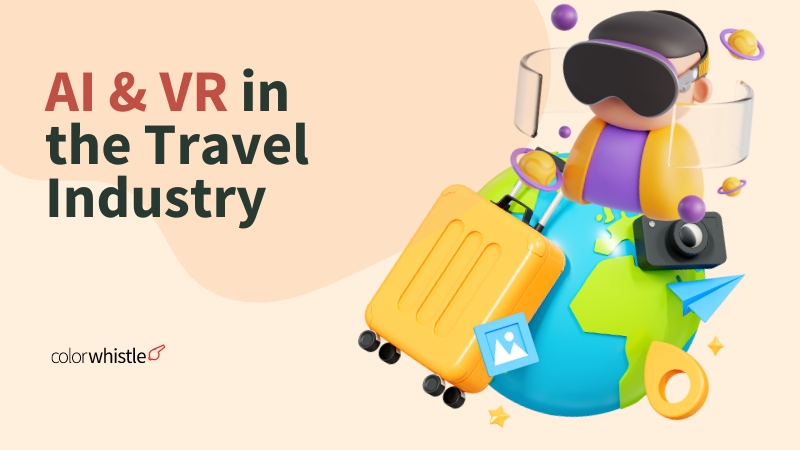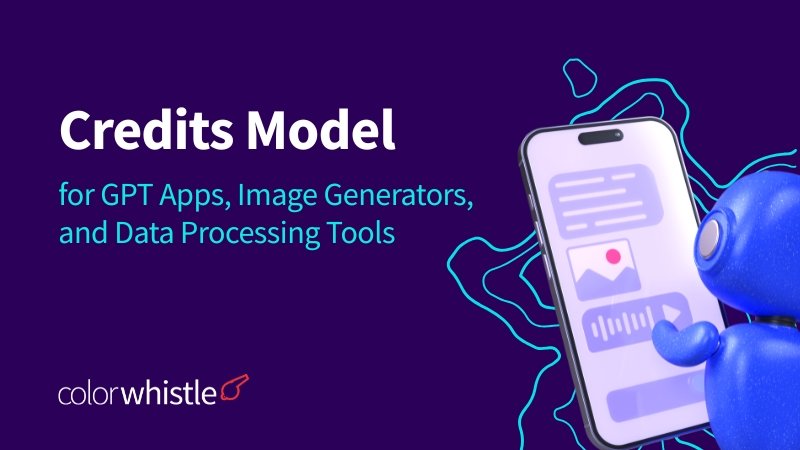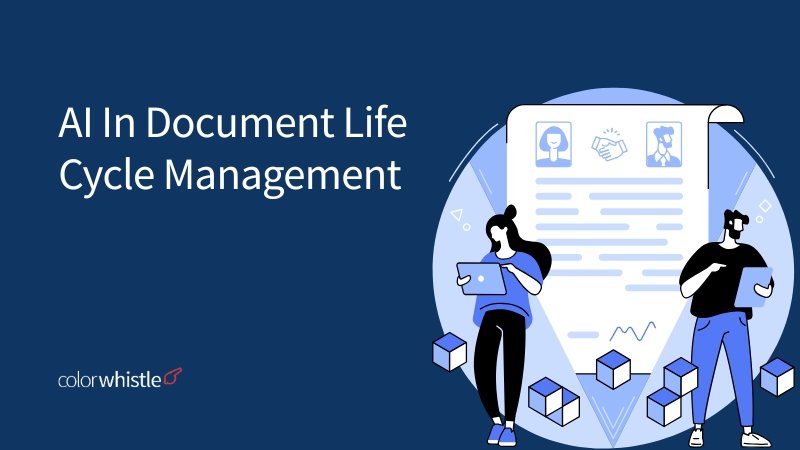AI Summary
Key Highlights of AI and VR Transforming Travel Industry
This post explores how AI and VR revolutionize the travel industry by replacing outdated practices with immersive, personalized experiences. The key insight: AI and VR enable virtual destination exploration, tailored itinerary recommendations, and seamless booking support, making travel planning efficient and accessible. Examples include Google Earth VR, Marriott's VRoom Service, and AI chatbots by KLM. These technologies benefit travelers by enhancing engagement, accessibility, and trip customization while reducing friction. The article also highlights future trends such as sustainable travel and advanced customer support. It serves travel businesses and technologists aiming to innovate and improve customer experience with AI and VR solutions.
Exploring the antiquated corridors of the travel industry reveals outdated practices that can make things difficult for travelers. But now, with new technologies like AI and VR, there’s a chance to make things better. These innovations can help update the travel industry and create smoother, more exciting travel experiences for everyone.
The integration of Artificial Intelligence (AI) and Virtual Reality (VR) with the travel industry is a game-changer. With AI consulting services and expertise from a leading website development company, these technologies revolutionize how travelers explore the world, offering immersive experiences and personalized adventures like never before.
Did You Know?
According to the study, roughly 21 percent of the surveyed companies’ revenue in the travel market was AI-influenced in 2021, rising sharply from just nine percent in 2018. As forecast, the share of AI-influenced revenue in the travel industry was predicted to rise to 32 percent in 2024. — Statista
AI and VR in the Travel Industry
Let’s explore how AI and VR is revolutionizing travel, offering immersive experiences, personalized recommendations, and seamless planning for adventurers.
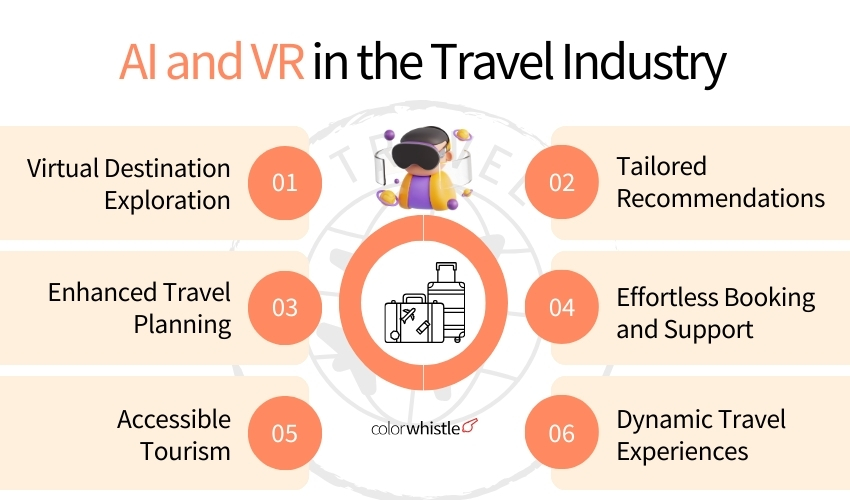
Virtual Destination Exploration
One of the most significant impacts of VR in the travel industry is its ability to take users to the desired destinations from the comfort of their homes. Travelers can explore iconic landmarks, historic sites, and natural wonders in stunning detail through immersive VR experiences. VR enables users to experience destinations firsthand, fostering a sense of wanderlust and excitement, whether walking through the bustling streets of Paris or diving into the colorful coral reefs of the Great Barrier Reef.
Enhanced Travel Planning
VR extends beyond mere sightseeing, allowing you to virtually explore accommodations, inspect restaurant layouts, and navigate transportation options within a destination. This empowerment enables you to meticulously plan every trip aspect, minimizing potential surprises along the way.
Accessible Tourism
VR is a gateway for individuals facing limitations or budget constraints that hinder traditional travel. Through VR experiences, people can explore historical landmarks, encounter endangered wildlife, or embark on virtual space expeditions – all from their homes.
Tailored Recommendations
AI algorithms analyze your travel history, preferences, and social media interactions to offer personalized suggestions for destinations, activities, and itineraries. Envision an AI assistant crafting a bespoke adventure tailored to your fondness for hiking and local gastronomy.
Effortless Booking and Support
AI-driven chatbots facilitate travel bookings, address inquiries around the clock, and provide real-time language translation. This streamlined approach removes friction from the travel planning process and offers continuous assistance throughout your journey.
Dynamic Travel Experiences
AI enhances your travel experience by personalizing itineraries based on real-time weather updates and local events. Additionally, AI algorithms offer recommendations for hidden gems, tailored to your current location and interests.
Also Read
Examples of AI and VR in the Travel Industry
Let us take a look at the real-world examples of AI and VR and how they are reshaping the travel industry.
Google Earth VR
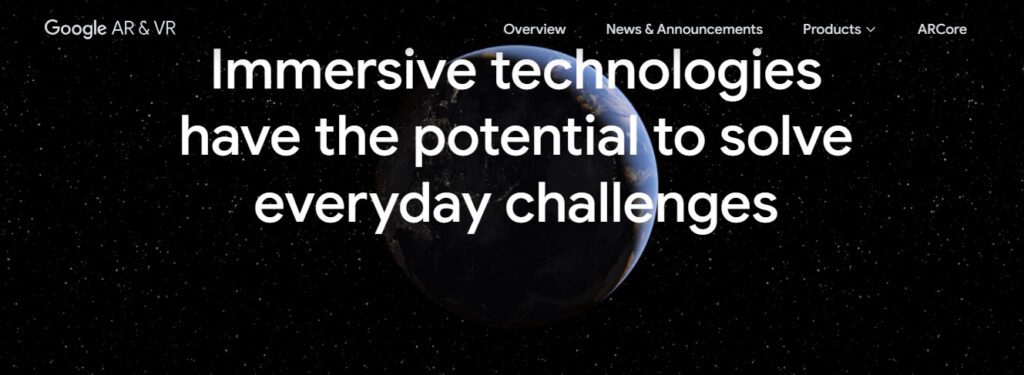
VR allows users to explore global landmarks virtually, offering an immersive experience akin to being there. Google Earth VR exemplifies this, enabling users to visit iconic sites like the Eiffel Tower or the Grand Canyon, providing a 360-degree view. These tours offer unique perspectives with unmatched scale and detail.
The British Museum
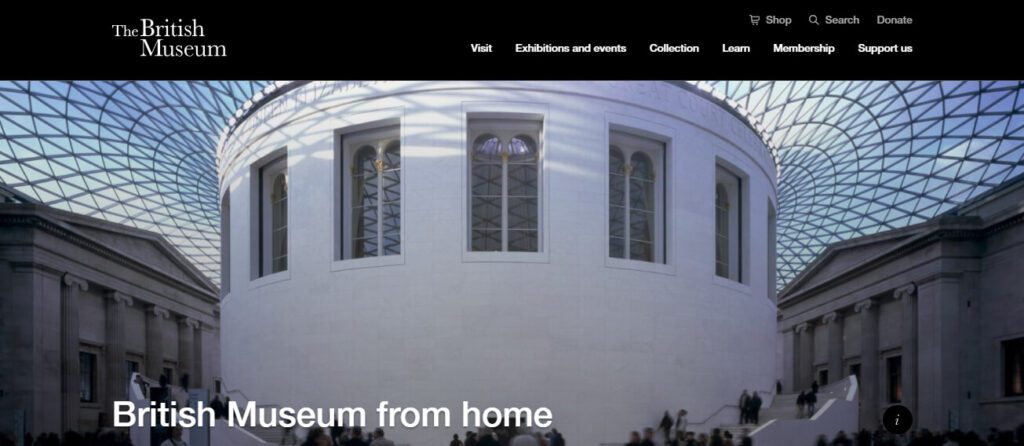
Virtual Reality enables interactive visits to museums and galleries worldwide, facilitating the exploration of exhibitions and artworks. This immersive experience enhances cultural accessibility and fosters art appreciation. Collaborations like the British Museum with Google Arts & Culture and the Louvre Museum in Paris offer virtual tours, democratizing art and culture appreciation globally.
Mondly VR

Virtual Reality aids language learning through immersive programs simulating real-world scenarios, enabling users to practice languages authentically. Mondly VR, a language learning app, offers immersive experiences where users practice speaking and listening skills in contexts like ordering food or asking for directions, enhancing language acquisition effectively and engagingly.
Marriott Hotels
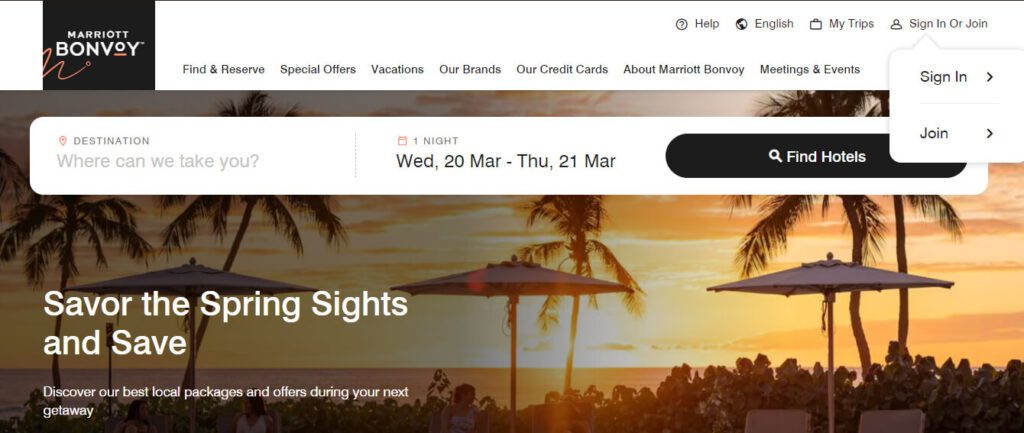
Marriott Hotels employs VR technology with “VRoom Service” for virtual travel experiences. Guests can request VR headsets, enabling immersive exploration of Marriott properties worldwide. This initiative boosts guest engagement, previews destinations, and drives bookings, enhancing overall customer satisfaction.
Airbnb

Airbnb employs AI algorithms to tailor search results and recommendations based on user’s history, preferences, and feedback. This optimization ensures accommodations align with travelers’ expectations. Additionally, Airbnb offers virtual experiences, enriching travel with guided tours and workshops hosted by locals worldwide, enhancing digital immersion.
KLM Royal Dutch Airlines
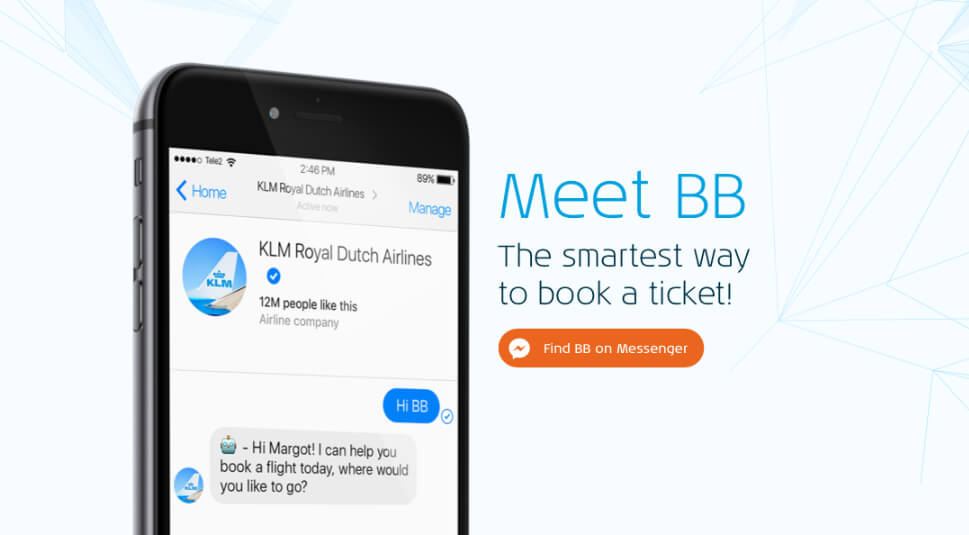
KLM Royal Dutch Airlines utilizes AI chatbots, such as its Facebook Messenger bot “BB,” to aid customers with flight bookings and itinerary changes. These bots employ natural language processing to offer personalized assistance in multiple languages, enhancing customer satisfaction and streamlining travel experiences for millions of passengers globally.
We provide a Custom web based 3D solution that aligns perfectly with your business goals and product needs.
Technical Challenges While Integrating AI and VR to Your Travel Businesses, and How ColorWhistle Can Provide You the Solutions?
Discover the technical hurdles of AI and VR integration in the travel industry, and how ColorWhistle offers tailored solutions.
Challenge: Complex Integration
Combining AI and VR technologies into existing online platforms requires complex technical integration. Ensuring seamless interoperability between AI-driven systems and VR interfaces poses a significant challenge.
Solution: Integrated Development Environment
We can develop an integrated environment that facilitates a stable integration of AI and VR technologies into existing online platforms. This environment should support APIs and SDKs for easy interoperability between different systems.
Challenge: Website Loading Times
VR content is data-intensive and can impact website loading times and performance. Balancing rich visual experiences with optimized performance requires advanced optimization techniques and infrastructure upgrades.
Solution: Website Performance Optimization
Our website development services team will utilize compression techniques and lazy loading to minimize loading times without compromising visual quality.
Challenge: Compatibility and Accessibility
Ensuring compatibility across various devices, browsers, and platforms is essential for delivering VR experiences seamlessly. Additionally, ensuring accessibility for users with different hardware configurations presents technical challenges.
Solution: Cross-platform Compatibility
We develop responsive interfaces that adapt to different screen sizes and input devices, ensuring compatibility and accessibility of VR experiences across various devices and platforms.
Challenge: User Interface Design
Designing intuitive user interfaces for AI-driven chatbots and VR experiences requires expertise in UX/UI design. Ensuring seamless interaction and navigation across different interfaces and devices presents technical hurdles.
Solution: UX/UI Design Expertise
Our UX/UI designers can create intuitive interfaces for AI-driven chatbots and VR experiences with their experience in website design services. You even have the option to hire a graphic designer to experience our full-fledged, design expertise. We conduct usability testing and iterate on designs to ensure seamless interaction and navigation.
Challenge: Managing Content
Managing and updating VR content, such as 360-degree videos or virtual tours, poses technical challenges. Implementing efficient content management systems to streamline content creation, editing, and distribution is essential.
Solution: Content Management Systems
We make sure that the content management systems (CMS) are specifically tailored for managing VR content. We also implement features such as version control, and automated workflows to streamline content creation and distribution.
Challenge: Integration with Existing Systems
Integrating AI and VR technologies with existing backend systems, such as customer relationship management (CRM) or booking systems, requires seamless integration to ensure data consistency and workflow efficiency.
Solution: API integration and Middleware
Our team can integrate AI and VR technologies with existing backend systems using our custom API services and middleware solutions.
Also Read
The Future of AI and VR in the Travel Industry
The future of AI and VR beyond 2026 will reshape travel with personalized experiences, advanced customer support via chatbots, real-time travel updates, sustainable resource management, crisis solutions, enhanced accessibility, and improved stakeholder collaboration. These innovations will streamline trip planning, service interaction, and overall travel experiences, fostering efficiency, inclusivity, and engagement.
By 2026, the VR and AR market in global tourism is projected to hit $9.6 billion
Sustainability leads with eco-conscious practices in transportation and hospitality. Augmented and Virtual Reality enhance travel experiences, while mobile technology streamlines bookings.
The Internet of Things customizes hotel amenities and tracks luggage, and biometrics expedite procedures securely. 5G connectivity boosts online services, and voice technology offers hands-free travel planning. Blockchain ensures transparency in bookings and loyalty programs.
If you are not sure about the utilization of AI and VR in your travel business, let’s start on a journey of exploration together and uncover the immense possibilities that await your brand with our tailored travel portal development services.
You can contact ColorWhistle by sending us a message or calling us at +1 (919) 234-5140, we’ll get back to you at the earliest. We provide services tailored to your requirements that suit your business. We are also experts at website development services, as well as web designing. You can approach us for any of these services to make a robust online presence for your business.
What’s Next?
Now that you’ve had the chance to explore our blog, it’s time to take the next step and see what opportunities await!

